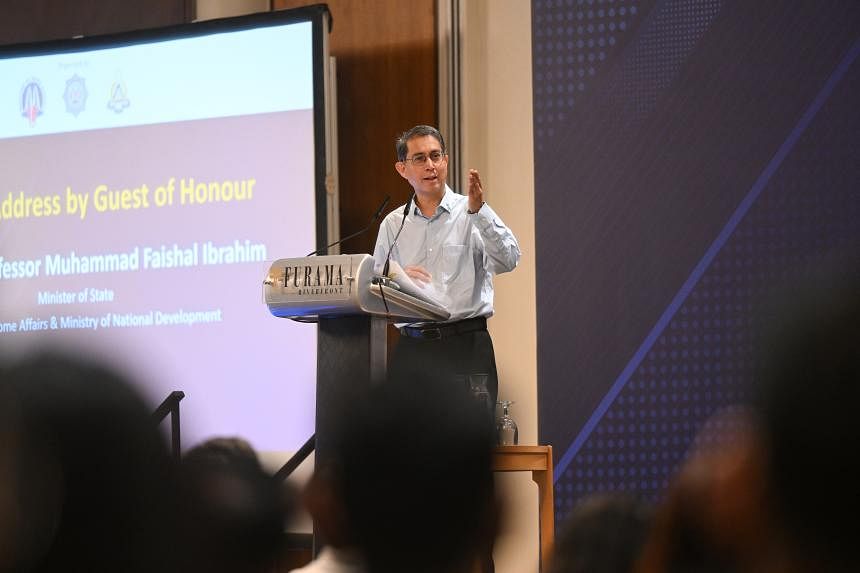
Samuel Devaraj
Updated
Apr 18, 2024, 08:24 PM
Published
Apr 18, 2024, 07:48 PM
SINGAPORE - The Republic is taking its anti-drug drive to classrooms amid reports showing a spike in young drug abusers, including teenagers who started using illicit substances before turning 18.
Speaking on April 18 at an anti-drug seminar, Minister of State for Home Affairs Muhammad Faishal Ibrahim said Singapore is concerned with the rise in young drug abusers.
“In Singapore, young drug abusers below 30 form around 27 per cent of our total drug abusers,” he said.
Figures from the Central Narcotics Bureau also showed that there was a near 17 per cent increase in young drug abusers arrested in 2023, compared with in 2022.
“Our schools will be extending preventive drug education to other subjects in the school curricula.
“In the institutes of higher learning (IHLs), these messages will be reinforced at various junctures, such as orientation sessions and pre-departure briefings for overseas trips,” said Associate Professor Faishal, who was speaking at the Harm Prevention Seminar.
The event, held at the Furama Riverfront Hotel, was organised by the Ministry of Home Affairs (MHA).
Prof Faishal said that a whole-of-community effort is needed to shape young people’s attitudes about drugs and tackle increasingly pervasive and liberal views on illicit substance use.
Citing a 2023 Institute of Mental Health study, which showed that 4 in 10 drug abusers in Singapore had started abusing drugs before the age of 18, Prof Faishal said a lack of maturity at this developmental stage can make young people susceptible to influence.
“They may feel that there is no harm to try, and that they can always stop when they want to.
“We are surrounded by sensationalised narratives and misinformation about drugs. There is an urgent need for robust, credible researchto shed light on drug harms and counter these narratives,” said Prof Faishal.
To this end, he said MHA is conducting studies with IHLs to understand the various factors for drug abuse, including biological, psychological as well as social factors.
“For instance, MHA is currently working with Nanyang Technological University to understand the various factors influencing youth drug abuse.
“These studies will provide us with research-based evidence to help us strengthen our drug prevention and rehabilitation efforts,” he said.
During a panel discussion at the same event, Prof Faishal said that, like other parents, he has conversations with his children about drug use as well.
Sharing a personal anecdote, he said when he was visiting his children, who were studying overseas, he smelled cannabis in dormitories where others resided.
He said: “You make sure you continue to encourage them to stay away. You can’t stop others from doing what they are doing, but you can help (prevent) your family members from entering the dark hole.”
The other forum panellists included Professor Emeritus Harvey Milkman from the Metropolitan State University of Denver, and Dr Leung Chi Ching, who is the lead psychologist at the Home Team Psychology Division.
Dr Leung said the support of families and the wider community is needed even after an abuser is incarcerated.
“Reintergation takes place in the community itself, with the help of the family and with the help of the community agencies.
“So that’s one of the reasons why we organised the Harm Prevention seminar. It is really to emphasise the importance that the family and the community really need to come together, and we need to galvanise everyone to work as one big community.”
In an interview with ST on April 17, Dr Leung said the rise in young drug abusers is worrying.
Remote video URL
Outcomes for young people who take drugs at a younger age are “much, much worse than for somebody who takes drugs in their late adolescence or early adulthood”, Dr Leung added.
“During the period of adolescence, the youth’s brain is developing. It is rapidly changing, it is making a lot of connections.
“If we introduce an addictive substance at this point of time, it actually affects the brain development to a quite a large extent,” said Dr Leung.
Repeat drug abusers raise S’pore’s 2-year recidivism rate
How do young people view drugs and what does it mean for Singapore?
Join ST's WhatsApp Channel and get the latest news and must-reads.
- Drug offences
- Drug consumption
- Ministry of Home Affairs
- Muhammad Faishal Ibrahim

